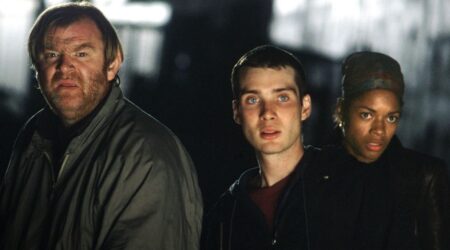Christopher Nolan’s epic biopic Oppenheimer dominated the conversation on cinema in 2023 and the Academy Awards, let alone the conversation on WWII movies. Whether you’re a fan of the movie or not, its box office run, stunning visuals, and myriad award nods have buried a lot of other WWII movies beneath its massive success.
2023 saw the release of a lot of other WWII movies from all over the world. These WWII movies tell stories from before, during, and after the war from all different perspectives. None of them were produced in the United States, and many demonstrate aspects of human suffering or post-war contemplation rarely exhibited in popular American media. Whether you’re looking for new insight into the tragedy and trauma of war or pure Nazi-killing entertainment, these seven recent WWII movies that aren’t called Oppenheimer are well worth your time.
Blood & Gold

Director: Peter Thorwarth
Platform: Netflix
Think of Blood & Gold as a bit of a riff on movies like Inglorious Bastards but smaller in scope and about a rogue German private who teams up with a whole town that’s sick of the Nazis to get revenge and protect the gold left behind by their former Jewish neighbors. A German-language Netflix Original, Blood & Gold is written by Peter Thorwarth and written by Thorwarth and Stefan Barth. It’s the kind of Nazi killing spree is the kind of WWII movie that caricatures Nazis, for sure. But it also astutely demonstrates their evil and why German resistance was so impossible. The extreme circumstances help demonstrate exactly why nothing like it ever could really have happened. They also provide a pretty entertaining form of catharsis with lots of dead Nazis.
Godzilla Minus One

Director: Takashi Yamazaki
Platform: Streaming on Netflix
One of, if not 2023’s best WWII movies, Godzilla Minus One is a grand evolution of the original Gojira formula. For all the ways the movie condemns the United States and its nuclear arsenal, director Takashi Yamazaki’s film is more interested in turning its lens inward. Godzilla Minus Ones is a spectacularly shot and scripted damnation of Japan’s inhumanity during and after WWII. While Western media often merely demonizes Japan as “the enemy,” this movie shows a broken society. Godzilla Minus One wrestles with the use of kamikaze pilots, what it means to be honorable, and who is responsible for rebuilding a devastated nation. It also contains some of the most striking effects of all time and a top-tier Godzilla creature design.
Hidden Blade

Director: Er Cheng
Platform: VOD
On the other side of Japan’s imperialism before and during WWII is writer and director Er Cheng’s Hidden Blade. Hidden Blade is a fantastic vehicle for Tony Leung to act as a spy. It’s also a salient and twisted story about the horrors Japan wrought across China and its neighbors throughout its imperial decades. WWII movies rarely address the depth of these horrors. General audiences may not even know the extent of them. But Hidden Blade does not shy away from gruesome depictions of the atrocities committed against civilians and soldiers alike during the days just before the bombing of Pearl Harbor.
The Lost Transport

Director: Saskia Diesing
Platform: Not currently available
Saskia Diesing’s The Lost Transport falls into the WWII movie category of “based on a true story,” but not really. There really was a German train full of Jews abandoned near the German town of Tröbitz in 1945. But a Jewish survivor Simone (Hanna van Vliet), Russian soldier Vera (Eugénie Anselin), and German townsperson Winnie (Anna Bachmann) did not bond under unbelievable circumstances to survive post-war. Despite its exaggerated hopefulness, The Lost Transport provides a window into understanding how people may have acted during desperate circumstances. Suspend your disbelief long enough to become enthralled with the story. Ultimately, it offers realism without demanding your forgiveness.
Reveille

Director:Michael Akkerman
Platform: VOD
On paper, Reveille is discouraging. It’s a movie by Michael Akkerman that seems to be asking, “What if Nazis were humans too?” German and American companies on the frontlines in Italy exchange fire and ultimately, prisoners. The vast majority of the movie is spent watching the surviving German soldiers suffer while the Americans argue about whether and how to help them. The language barrier keeps them from being able to truly communicate with each other. However, it’s almost like the whole movie is a play for the audience’s sake anyway. The beat-by-beat plot is insignificant. Reveille is all about how you will ultimately decide to see these three men. Are they Nazis? Are they soldiers and enemy combatants? Or are they human beings with the same rights to medical assistance and a lack of suffering like anybody else? Reveille probably has it’s own opinion, but it won’t judge you for whatever stance you take.
Sisu

Director: Jalmari Helander
Platform: VOD
Another for the category of WWII movies all about taking revenge. Sisu is Jalmari Helander’s Finnish-language Nazi murder-fest. Aatami (Jorma Tommila) is trying to put his war to an end. The Nazis, however, won’t let him. They want his gold. Through a bloody game of cat and mouse, Aatami slowly fights an entire squadron of bloodthirsty Nazis while surviving one. impossible situation after the next. And he does it with the help of a band of freed female prisoners with an axe to grind. It’s a high-octane romp if there ever was one. Yet, it’s extremism does well reiterating that no Nazi deserves forgiveness for their inhumanity.
The Zone of Interest

Director: Jonathan Glazer
Platform: In Theaters Now and Premium VOD
Oppenheimer’s main WWII-interested awards season competitor is Jonathan Glazer’s The Zone of Interest. It’s based loosely on a Martin Amis book of the same name. The Zone of Interest is one of the most harrowing and complicated WWII and Holocaust movies ever made. For nearly its entire runtime, you simply watch a German family live its fairly mundane life. Husband (Christian Friedel) and wife (Sandra Hüller) spat. Neighbors enjoy lavish parties at their estate. Children run around with their dog. And in the background of it all stands the unmistakable barracks of Auschwitz. With a deafeningly brutal soundscape, The Zone of Interest demands you ask yourself whether you’ve been inured to the human suffering around you. Positing that all the world chooses to blind itself to atrocity, this movie refuses to let you turn away. You must walk away from it, recognizing your own complicity.
Oppenheimer was far from the only movie attempting to wrestle with the lessons humanity needs to derive from WWII. The difference between Oppenheimer and these seven other WWII movies is that Oppenheimer’s story is nothing new. American greed and imperialism are the subject of countless stories. And while it’s told well in Oppenheimer, and its point remains as salient as ever, the American and British perspective on WWII is far from the only one. Hopefully, these seven other recent WWII movies can at least offer entertainment, if not new lessons from some of the darkest hours in human history.







